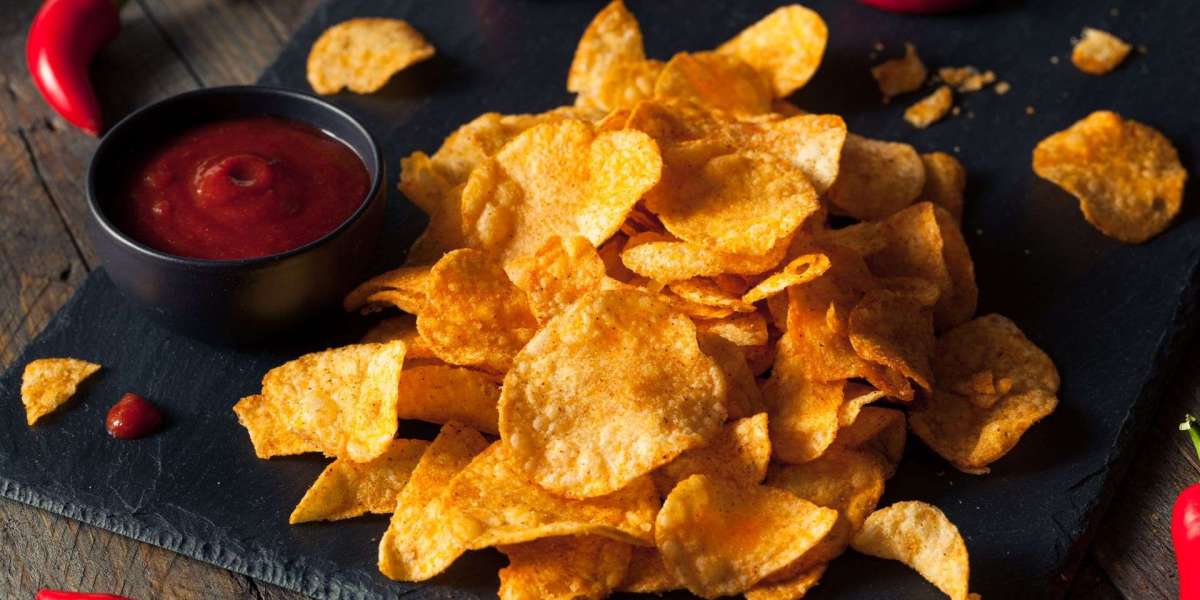According to a recent report by Renub Research, the Global Potato Chips Market was valued at US$ 35.23 Billion in 2023 and is projected to reach US$ 49.07 Billion by 2032, growing at a CAGR of 3.75% from 2024 to 2032. This market expansion is driven by evolving snacking behaviors, innovative flavor launches, increased demand for convenience foods, and the growing popularity of healthier, baked, and organic variants.
Snacking Culture is Reshaping the Global Food Industry
Snacking is no longer just a between-meal indulgence—it's becoming an essential part of daily diets across the globe. Consumers are increasingly seeking quick, accessible, and tasty snack options, especially in urban environments where fast-paced lifestyles dominate.
Potato chips, a long-standing favorite in the global snack food category, are adapting to this trend by offering portioned packs, healthier formulations, and unique flavors. From family-sized party packs to single-serve options for on-the-go consumption, manufacturers are diversifying formats to suit consumer lifestyles.
Flavor Innovation and Regional Tastes Driving Demand
One of the major factors contributing to the steady growth of the global potato chips market is flavor innovation. Brands are constantly experimenting with regional, exotic, and fusion flavors to attract younger demographics and retain existing customers.
Popular global flavor trends include:
Wasabi, sour cream & onion, jalapeño, peri-peri, barbecue, and masala
Limited edition, co-branded, and celebrity-endorsed variants
Organic, gluten-free, and non-GMO options
This wave of customized, culturally influenced, and seasonal offerings is helping brands tap into both mainstream and niche markets worldwide.
Health-Conscious Consumers Driving Growth of Baked and Air-Fried Chips
As consumers become more health-conscious, the demand for low-fat, baked, air-fried, and reduced-sodium potato chips is surging. Health trends like keto, paleo, vegan, and gluten-free diets are encouraging chip producers to explore alternatives to traditional deep-fried varieties.
Manufacturers are responding with:
Baked chips that maintain crunch while cutting oil content
Organic chips made with non-GMO potatoes and natural flavors
Plant-based and allergen-free options for sensitive consumers
Chips fortified with protein or fiber for added nutritional value
This evolution toward functional and guilt-free snacking is broadening the consumer base and ensuring brand loyalty among wellness-oriented buyers.
E-Commerce and Digital Promotions Fuel Global Reach
The global potato chips market is also experiencing a boom due to the expansion of online retail and direct-to-consumer platforms. E-commerce giants like Amazon, Walmart, Alibaba, and Flipkart are reshaping consumer access to packaged snacks, enabling customers to browse hundreds of chip varieties from around the world.
Digital marketing campaigns and social media influencer promotions are accelerating product discovery and influencing purchase decisions. Personalized online discounts, bundle packs, and subscription snack boxes are giving brands new channels to engage with target audiences.
Asia-Pacific and North America Lead Market Growth
North America:
The U.S. remains the largest potato chips market globally, owing to high per capita consumption, strong brand presence (like Lay’s, Pringles, and Ruffles), and the region's deeply embedded snacking culture. Health-conscious variants and plant-based options are particularly gaining ground in the U.S. and Canada.
Asia-Pacific:
The Asia-Pacific region is emerging as the fastest-growing market, led by India, China, Japan, and South Korea. Urbanization, a growing middle class, and rising disposable incomes are fueling demand for convenient and western-style snacks.
Moreover, local flavor adaptations—such as Sichuan pepper, seaweed, curry, and green tea-infused chips—are helping global brands localize effectively and capture regional markets.
Competitive Landscape: Innovation and Branding Remain Key
The global potato chips industry is highly competitive, dominated by multinational giants and regional players. Market leaders continue to focus on R&D, new product launches, packaging innovations, and strategic collaborations to maintain their market share.
Key players include:
PepsiCo (Lay’s, Ruffles, Walkers)
Kellogg Company (Pringles)
Calbee Inc.
UTZ Brands Inc.
Herr’s Foods
Kettle Foods (owned by Campbell Soup Company)
These brands invest heavily in flavor innovation, sustainable sourcing of ingredients, and advanced manufacturing technologies to meet dynamic consumer preferences.
Sustainability and Eco-Friendly Packaging Trends
Environmental sustainability has become a crucial consideration for both brands and consumers. Companies are working to reduce their carbon footprint by:
Using biodegradable and recyclable packaging
Sourcing sustainably grown potatoes
Optimizing energy-efficient manufacturing practices
Consumers are increasingly rewarding companies that prioritize transparency, ethics, and eco-conscious packaging, adding a new dimension to brand loyalty.
Challenges: Raw Material Costs and Health Scrutiny
Despite the positive outlook, the potato chips market faces challenges such as:
Fluctuating potato prices and supply chain disruptions
Rising costs of edible oils and packaging materials
Regulatory restrictions on salt, fat, and artificial additives
Criticism from health advocacy groups about obesity and poor nutrition
Brands are tackling these issues by diversifying their supplier base, investing in automated and cost-efficient production processes, and creating healthier alternatives that comply with evolving food safety standards.
Future Outlook: A Crunchy Road Ahead
The global potato chips market is expected to maintain steady growth in the coming decade, backed by:
Continued consumer demand for ready-to-eat snacks
Strong product differentiation via flavors and functional benefits
Expansion into emerging markets through aggressive marketing and localized offerings
Innovation in manufacturing and packaging technologies
Rising collaborations with food service and quick-service restaurants (QSRs)
Companies that invest in healthier portfolios, digital engagement, and sustainable production will be best positioned to capitalize on the evolving preferences of global snackers.
New Publish Report:
- UAE Quick Service Restaurant (QSR) Market Forecast 2025-2033
- Saudi Arabia Quick Service Restaurant (QSR) Market: Trends, Growth Drivers, and Forecast 2025–2033
- United Arab Emirates Quick Service Restaurant (QSR) Market Size, Share & Forecast 2024–2033
About the Company
Renub Research is a Market Research and Consulting Company with more than 15 years of experience, especially in international Business-to-Business Research, Surveys, and Consulting. We provide a wide range of business research solutions that help companies make better business decisions. We partner with clients across all sectors and regions to identify their highest-value opportunities, address their most critical challenges, and transform their businesses.
Our wide clientele includes key players in Healthcare, Travel & Tourism, Food & Beverages, Power & Energy, Information Technology, Telecom & Internet, Chemicals, Logistics & Automotive, Consumer Goods & Retail, Building & Construction, and Agriculture. Our core team comprises experienced professionals with graduate, postgraduate, and Ph.D. qualifications in Finance, Marketing, Human Resources, Bio-Technology, Medicine, Information Technology, Environmental Science, and more.
Media Contact
Company Name: Renub Research
Contact Person: Rajat Gupta, Marketing Manager
Phone No: +91-120-421-9822 (IND) | +1-478-202-3244 (USA)
Email: [email protected]
Website: https://www.renub.com/potato-chips-market-p.php



